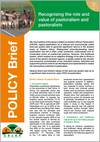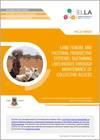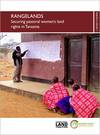Pastoralism is a rational and viable economic land-use system able to generate significant returns in the dryland areas of Eastern Africa. Widespread misunderstanding about pastoralism has left it often under-protected, undervalued and an unintended victim of uninformed policies. However, this traditional livelihood system, which evolved as an adaptive strategy for thriving in some of the world’s harshest regions, is ideally suited to the climatic and economic uncertainties of our turbulent century. Therefore, informed and supportive policies need to be developed and implemented to realise the tremendous potential of pastoralism. This policy brief aims to facilitate informaed policy making by elaborating the direct and indirect values of pastoralism.
Year of publication: 2017Organization:
Topic: Cambio climático, Economía, Servicios ambientales, El conocimiento indígena, Tierra, Resiliencia
Language: English
Type of document: Técnico
Geographical coverage: África Oriental
This report studies the policy and regulatory frameworks in IGAD and EAC regions of Africa, so as to inform advocacy by civil society and pastoralist groups in the two regions. It explains the link between food sovereignty and pastoralism, outlines the major regional policies related to pastoralism in the Horn and Eastern Africa, and discusses the challenges and opportunities related to these policies. It looks at the role of civil society organisations (CSOs) in articulating pastoralists’ concerns to policy frameworks at all levels and suggests how pastoralist communities, CSOs and other stakeholders could take advantage of the regional policies to advance the cause of food sovereignty.
Year of publication: 2017Organization: Autores individuales
Topic: Seguridad alimentaria, Pueblos indígenas, Organización, Participación
Language: English
Type of document: Técnico
Geographical coverage: África Oriental
New fringe pastoralism : conflict and insecurity and development in the Horn of Africa and the Sahel
This report focusses on some new fringe activities that have developed among pastoralists such as cross-border trade and trafiicking and smuggling. It sees these activities as emerging from a changing relationship between the pastoralists, the state, and their national and transnational mobility. Although undertaken by only a handful of pastoralists, these activities have far-reaching national, regional and global impacts.
This report is not a conventional study of pastoral socioeconomic production and reproduction systems as a whole, but instead is limited to exploring some new fringe activities with consequences for the present and future of pastoralism as a resilient and ever adaptive way of life despite the pressures and myriad of challenges it faces.
Organization: Autores individuales
Topic: Conflicto, Economía, Finanzas, Resiliencia
Language: English
Type of document: Técnico
Geographical coverage: Norte de África, África Occidental, África Central, África Oriental, África Meridional
This report looks at transhumant (or nomadic) pastoralism – the movement of livestock from one place to another between wet and dry seasons – and the dynamics of conflicts between farmers and pastoralists, which have steadily increased in Nigeria in recent years. It outlines the causes of increased pastoralist-farmer tensions as well as the position of pastoralists in Nigeria. It explores the challenges to developing conflict prevention mechanisms at local and national levels, and identifies potential entry points for doing so.
Year of publication: 2017Organization: Autores individuales
Topic: Conflicto
Language: English
Type of document: Técnico
Geographical coverage: África Occidental
Pastoral communities are facing increasing pressure on their livehoods due to depletion and degradation of their productive resources. Land tenure plays a decisive role in sustaining pastoral productive systems. However, these communities are also facing pressures on their land as a result of misconceptions about pastoralism, changing demographics, urbanisation, climate change, and environmental degradation. In addition, public policy has not always favoured the development of pastoralism. Given that pastoral communities reside in areas characterised by arid and semi-arid conditions, and where alternative uses of land such as crop farming may not be possible, this policy brief argues for the maintenance of collective land tenure as it enhances the sustainability of pastoral productive systems.
Year of publication: 2017Organization: Evidencias y lecciones desde América Latina (ELLA)
Topic: Pueblos indígenas, Tierra
Language: English
Type of document: Técnico
Geographical coverage: Global
This Grant Results sheet highlights the outcomes of activities supported by the International Fund for Agricultural Development (IFAD) with the goal of developing sustainable land management and resilient livelihoods in rangeland environments.
Year of publication: 2017Organization: Fondo Internacional de Desarrollo Agrícola (FIDA)
Topic: Cambio climático, Conflicto, Economía, Tierra, Resiliencia
Language: English
Type of document: Técnico
Geographical coverage: Norte de África, África Occidental, África Central, África Oriental, África Meridional
This book summarizes the current status of scientific and management knowledge
regarding global rangelands and the major challenges that confront them. It is organized around three major themes: the first summarizes recent theoretical and conceptual advances in rangeland science and management, the second tries to alaborate on the implications of these advances for management recommendations and policy decisions, and the third theme evaluates some of the major challenges confronting global rangelands in the 21st century.
Organization: Autores individuales
Topic: Cambio climático, Servicios ambientales, Tierra, Valeur ajoutée
Language: English
Type of document: Científico
Geographical coverage: Global
A study report on the nature of pastoral women’s rights and the specific constraints and opportunities that they face with respect to access to land and natural resources in their everyday lives. It reviews the existing customary and statutory land rights in the villages visited, the specific opportunities and challenges that women in those villages have faced, their awareness, and the impact, of recent land reform processes. It also discusses women’s empowerment initiatives in strengthening women’s land rights, and the scope and desirability of further improvements to women’s land rights.
Year of publication: 2017Organization: Coalición Internacional para el Acceso a la Tierra (ILC), Instituto Internacional de Investigación en Ganadería
Topic: Género y juventud, Tierra
Language: English
Type of document: Técnico
Geographical coverage: África Oriental









